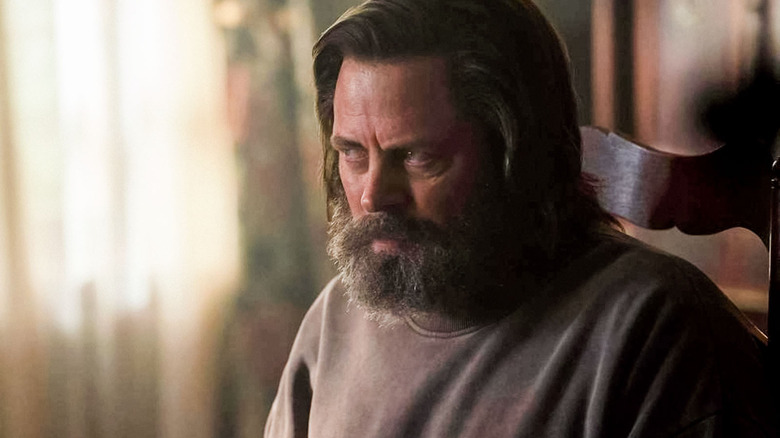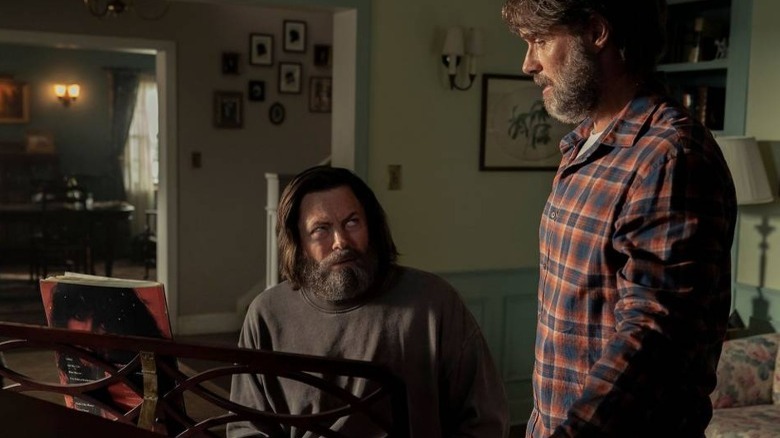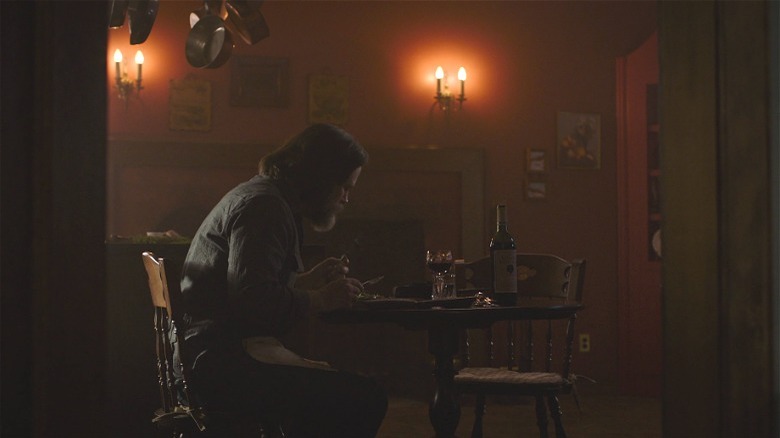Nick Offerman Had 'Visible Nerves' When It Came To Getting His The Last Of Us Character Right [Exclusive]
This post contains spoilers for HBO's "The Last of Us" and the video game series of the same name.
Craig Mazin and Neil Druckmann have lovingly adapted "The Last of Us" into a stunning, emotionally resonant story about isolation and companionship in the face of the world coming to an end. Managing to fulfill the dual roles of honoring the source material and taking artistic liberties that significantly improve upon existing storylines, HBO's "The Last of Us" has been consistently edging towards near-perfection with each episode. With episode 3, the series recontextualizes the fates of Bill (Nick Offerman) and Frank (Murray Bartlett) while fleshing out the nuances of their life together in beautiful and heartbreaking ways.
Although the events of this episode significantly alter canon, it does so in a way that is loyal to the essence of these two characters, to the point that their absence haunts us even after the credits roll. To be able to evoke such strong, authentic emotions for two people whose entire lives unravel over a single episode is no small feat — especially with the looming anxiety of doing justice to Bill, who is a complex but beloved character from the games. As per series cinematographer Eben Bolter, Offerman experienced "a great deal of nervousness" while slipping into the shoes of the guarded survivalist, who gradually opens up to the love of a man who makes him feel safe enough to feel vulnerable in a hellish world.
Here's how Bolter perceived the scenes involving Offerman while being present on the set of "The Last of Us."
A perfect storm of great ingredients
/Film's Valerie Ettenhofer recently interviewed Bolter about the nitty-gritties of bringing such a prolific game-franchise to life, and asked him whether there were anxieties around shooting episode 3, which is essentially Bill and Frank's episode. Bolter clarified that while there was the understandable pressure of doing the characters justice, the cast and crew knew that they were in good hands, as Mazin's "golden script" and Druckmann's involvement made it easier to streamline a profoundly heartfelt story about two people in love. Bolter talked about his perception of Offerman's body language on set, and how the actor's nervousness might've ended up working in favor of the character:
"I think in terms of that singing scene with Nick ... Nick's a straight man in real life playing a gay character. ... The thing that I thought ... added to the magic was [that] his character was experiencing these emotions for the first time, and [he] had a great deal of nervousness. So the singing scene, the love scene: I think a lot of Nick's genuine feelings were perfect for the character, and the character's journey, and the character's story."
Bolter also says that he remembers seeing Offerman's hand "shaking between takes," and that this genuine anxiety organically transitioned onscreen into Bill's anxiety about letting his guard down and experiencing love for the first time. Bolter is right, as Offerman plays Bill with the perfect amount of repressed yearning that is characteristic of a man who has been forever on his guard. With the arrival of Frank, the walls around him crumble — although he is terrified of such intense vulnerability, he slowly allows himself to be known, and opens up to receiving the love he so earnestly wants to give.
Why's Offerman's Bill is perfect in The Last of Us
When Bill is first introduced in episode 3, he is a hardened survivalist. Bill's natural attunement to his solitude is reflected in the montage of him blowing up the infected who turn up at his perimeter and intensely savoring what life has to offer. The sudden presence of Frank on his property disrupts this seemingly idyllic equilibrium. For the first time in his life, Bill is faced with the prospect of letting his guard down, thanks to Frank's natural charm and ability to make Bill feel seen within moments of their encounter.
This process of peeling away these emotional layers, which also comes with embracing his sexuality, is reflected in the scene where he sings Linda Ronstadt's "Long Long Time," which also happens to be the title of the episode. This is Bill being cautiously vulnerable, terrified to open up after a lifetime of isolation. Frank's recognition and reciprocation of Bill's longing allow for the blossoming of a beautiful phase in both of their lives — maybe, they don't have to be alone in such a cruel world. Maybe, there's space for warmth and love after all, where two lovers can live and love and quarrel and grow strawberries together in their quaint backyard.
While Bartlett is brilliant as the assertive and compassionate Frank, Offerman brings incredible nuance to his Bill, which adds greatly to the central story. For instance, the vulnerable tremor in Bill's voice when he is held by Frank for the first time, and the bittersweet avowal of love when he decides to die alongside him, are emoted to perfection by Offerman. The results are gut-wrenching, culminating in an absolute tear-jerker of an episode that is grounded in a sincere celebration of love in the face of imminent death.


